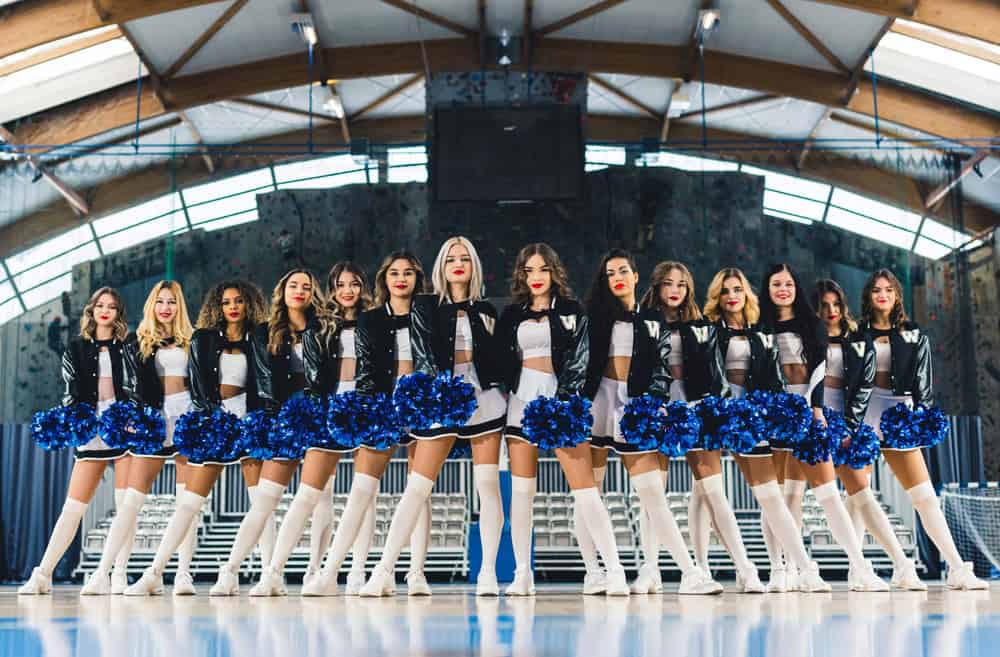
November 4, 2025
Cheer Athletics Plano, one of the nation’s most recognized all-star cheer gyms, filed for Chapter 11 bankruptcy just hours before a state-court trial was set to begin over allegations that former coach Jason “Jay” McCartney repeatedly sexually assaulted two sisters when they were minors. The filing immediately paused the trial, a move survivors’ attorneys criticized as a clear attempt to avoid accountability. The case names McCartney, multiple Cheer Athletics business entities, and the U.S. All Star Federation for alleged failure to act despite prior warnings. Cheer Athletics, which has faced other misconduct lawsuits, claims the bankruptcy is necessary after years of legal costs and says it will continue operations. Questions remain about intertwined corporate entities and whether assets were shifted to shield liability. Additional pending litigation includes a federal disability discrimination suit. Survivors’ attorneys vow to challenge the bankruptcy and continue pursuing justice. [Read more on this.]
October 7, 2025
A former metro Atlanta cheerleader filed a 122-page lawsuit alleging that former Barrow County coach Charles Moore groomed and sexually assaulted her over several years, and that gyms, school officials, and major cheer organizations, including Varsity Brands and USA Cheer, ignored clear warning signs. The complaint claims Moore was “on the radar” of top cheer bodies long before his 2024 arrests on felony child exploitation charges. Attorneys say multiple other victims have already been identified and expect many more. The suit accuses defendants of gross negligence, lax oversight of adult-minor interactions, and putting the prestige and profits of competitive cheerleading ahead of athlete safety. The case aims to expose institutional failures and force systemic reforms while seeking justice for survivors. [Read more on this.]
June 20, 2025
Varsity Spirit announced a new professional cheerleading league launching in 2026, but the rollout arrives as the company faces dozens of sexual abuse lawsuits tied to coaches and gyms within its vast event network. Survivors allege Varsity and affiliated bodies like USASF enabled a culture where abusers were protected because they generated revenue. Lawsuits include federal claims under the Protecting Young Victims from Sexual Abuse Act and civil RICO. Although Varsity denies liability and has not issued a formal apology, lawsuits continue progressing in multiple courts after attempts to consolidate the cases were rejected by the Judicial Panel on Multidistrict Litigation. Advocates argue the Pro Cheer League is a reputational distraction unless the company first takes real responsibility and implements stronger safeguards. Survivors’ attorneys continue to accept new claims as investigations expand. [Expanded coverage.]
June, 2023
A federal judge in South Carolina ruled that a group of twelve former youth cheerleaders could continue pursuing key claims against Varsity Brands and the U.S. All Star Federation (USASF) related to sexual abuse by coaches affiliated with Rockstar Cheer. The decision rejected Varsity’s argument that it owed no legal duty of care to athletes, allowing negligence and unjust enrichment allegations — along with USASF safety-oversight claims — to move forward. Survivors’ attorneys described the ruling as a major legal milestone, opening the door for broader corporate accountability across the competitive cheer industry.
October, 2022
Following the shocking death of Rockstar Cheer founder Scott Foster amid a federal investigation into alleged sexual abuse of minors, multiple Jane and John Doe plaintiffs filed the first civil lawsuits linking Varsity Spirit and national governing bodies to systemic failures that enabled the misconduct. The complaints allege that known predators were allowed continued access to underage athletes, fueled by a culture that valued revenue and brand dominance over child safety. These filings marked the beginning of the national legal fight survivors are now waging against the corporate power structure behind competitive cheer.
If you Google “Varsity Spirit,” the brand behind America’s dominant cheerleading competitions and apparel, you’ll find page after page of promotional content: championship results, athleticwear, event schedules, and corporate partnerships.
Not a single link on the first seven pages references the dozens of lawsuits accusing Varsity-affiliated coaches and gyms of sexual abuse. Even a search for “Varsity Spirit sexual abuse” returns results largely controlled by the company itself. This includes athlete protection PR statements and a public letter from the company’s president.
That letter, titled “A Letter To Our Community,” was published by Varsity Spirit President Bill Seely in October 2022 following the first wave of high-profile federal cheerleading sexual abuse lawsuits.
“We wholeheartedly support survivors and their pursuits of justice against those individuals responsible,” Seely wrote. But the letter quickly shifts tone. “We are exploring all avenues, including legal measures, to defend ourselves from any false narrative….”
Yet, according to the federal complaints that have been filed in multiple states, that’s exactly what survivors and their attorneys allege happened. These lawsuits claim that Varsity Spirit, along with its parent company Varsity Brands, former owner Bain Capital, governing bodies like the U.S. All Star Federation (USASF) and USA Cheer, and a network of private gyms and coaches, enabled a system where minors were groomed, abused, and silenced.
The lawsuits detail how known abusers remained in power, how young athletes were sent to competitions across state lines with little adult supervision, and how financial incentives created a culture of impunity.
Now, even as Varsity launches a professional cheerleading league and expands its global footprint under new ownership by the private equity firm, KKR, which acquired Varsity for $4.75 billion, survivors aren’t staying quiet. They are still coming forward, and legal avenues remain open. If you or your child was abused by a cheer coach affiliated with Varsity Spirit, USASF, USA Cheer, or any of the following gyms or organizations, you may still be eligible to file a claim:
The lawsuits are mounting and so is the evidence. This page explains what survivors need to know about Varsity Spirit sexual abuse lawsuits, who is being held accountable, and how to take legal action while there is still time.
In 2020, a series of USA Today investigations (blocked by a paywall) revealed a troubling pattern within competitive cheerleading. At least 180 individuals working with youth cheerleaders had criminal records for sexual misconduct involving minors. Yet, despite these findings, the sport’s two primary governing bodies—USA Cheer and the U.S. All Star Federation (USASF)—had banned or suspended only 21 individuals at the time of the report.
USASF and USA Cheer were formed to establish national safety standards in cheerleading, especially following the explosive revelations involving USA Gymnastics team doctor Larry Nassar that led to more than 250 survivors coming forward with allegations of abuse. While most Olympic and amateur sports organizations adopted enhanced oversight under the 2018 SafeSport Act, competitive cheerleading has been slower to modify its safety standards.
USASF oversees eligibility for Varsity-sponsored competitions, maintains the official ineligibility list for banned or suspended coaches, and requires gyms to pay annual dues in order to participate in events nationwide. Many of the individuals on the banned list have been accused of sexual or physical abuse. But the system remains flawed.
Some Varsity cheerleaders who have been the victims of sexual abuse, assault or harassment think it’s too late or their story “doesn’t count,” or that an attorney costs too much to pursue justice. But a few seconds is all it takes to learn if you or a loved one may qualify.
Your information will be kept private and shared only with attorneys who may be able to help. There are no upfront attorney fees. The attorneys we work with typically work on a contingency basis, meaning they only get paid if you receive compensation. Any legal fees or case-related expenses will be clearly explained by the law firm before representation begins.
Despite background check requirements and policies to address abuse, known predators have slipped through the cracks. One such case involved a registered sex offender in Ohio who owned and operated a cheerleading gym, continuing to work with minors under the radar of governing bodies. This wasn’t an isolated lapse. Survivor lawsuits argue that it’s part of a broader failure to detect, investigate, and act.
Reports suggest that enforcement of athlete protection policies is inconsistent. Moreover, internal investigations are minimal or non-existent. Allegations are often handled quietly, if at all. Survivors and advocates argue that Varsity and its affiliated organizations operate in a culture that prioritizes revenue and brand protection over the safety of athletes.
Even when allegations are substantiated, follow-through is often unclear. Coaches removed from one gym or state frequently resurface elsewhere. And while USASF’s banned list is public, it relies heavily on outside reporting and legal convictions rather than proactive screening or industry-wide transparency.
The sexual abuse scandal involving USA Gymnastics and disgraced team physician Larry Nassar led to sweeping national outrage and the eventual passage of the SafeSport Act in 2018. That law established new standards for youth safety in Olympic and amateur sports, requiring mandatory reporting, independent investigations, and more rigorous background checks. Nassar’s abuse spanned two decades and, as mentioned, affected more than 250 athletes while institutions like Michigan State University and USA Gymnastics ignored or buried reports of misconduct.
While competitive cheerleading is not an Olympic sport, its national governing bodies—USA Cheer and the U.S. All Star Federation (USASF)—were expected to follow SafeSport guidelines. Yet the aforementioned investigations by USA Today suggest that cheerleading’s leaders have failed to implement those protections meaningfully. This negligence has led to a sport with millions of youth participants but systemic blind spots that mirror those seen in USA Gymnastics.
USASF and USA Cheer manage gym registration, coach certification, and event oversight for much of the industry, particularly for competitions run by Varsity Spirit. Though their stated mission is to create a safe environment for athletes, the system is riddled with loopholes, as evidenced by the 2020 USA Today investigative report that identified the 180-plus individuals involved in cheerleading who had criminal records for sexual misconduct involving minors.
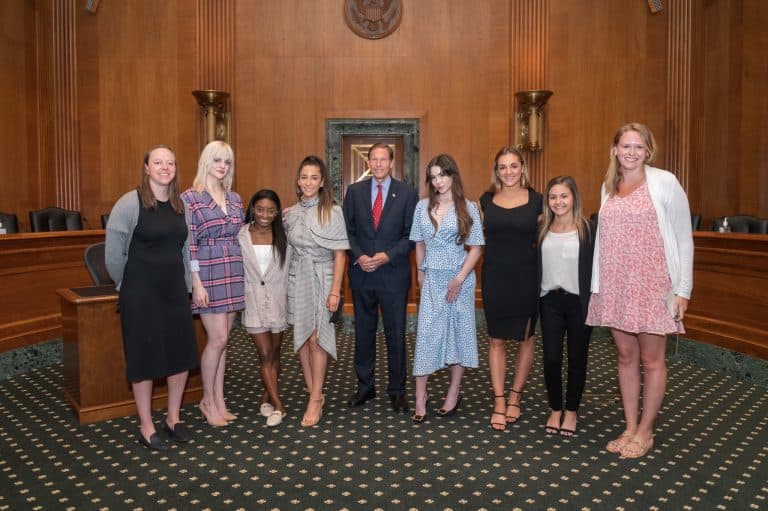
Thanks to the Netflix documentary series Cheer, the country was introduced to the intense physical demands, competitive drive, and close-knit culture of elite cheerleading.
One of the most high-profile examples of institutional failure came in 2020, when Cheer cast member Jerry Harris was arrested by the FBI for producing child pornography. Harris later admitted to engaging in the sexual abuse of minors. The civil suit against Harris spurred a wave of lawsuits. These lawsuits alleged that USASF, USA Cheer, and Varsity Spirit were notified of misconduct involving Harris but failed to investigate, and accused the organizations of employing or credentialing adults known to pose risks to children.
Varsity Brands’ Memphis-based subsidiary, Varsity Spirit, LLC, known simply as “Varsity,” is the dominant commercial force in competitive cheerleading. Through its control of events, uniforms, gym memberships, and media contracts, Varsity has shaped not only the culture but also the structural governance of the sport in the U.S. for decades.
At the heart of this influence are two organizations charged with athlete eligibility and safety: USA Cheer and the U.S. All Star Federation (USASF). Though technically independent, both were either created by Varsity or maintain deep, long-term affiliations with it. The relationship is less like an industry partner and more like a corporate parent cloaked in regulatory language.
To critics, the dynamic resembles a company setting its own rules through two subsidiaries wearing different hats—one as regulator, the other as enforcement arm. The result is a system where Varsity appears to outsource responsibility for safety. But behind the scenes, Varsity is most certainly pulling the strings. Despite the appearance of separation, decisions made by USA Cheer and USASF often align with Varsity’s business interests.
Over the years, Varsity has been accused of monopolizing the sport, using its influence over competitions, gyms, and governing bodies to restrict market access and suppress competition. These accusations culminated in a May 2024 class-action settlement of $82.5 million. Plaintiffs alleged that Varsity Brands and its previous owners monopolized cheerleading competitions, camps, and apparel markets. The resolution followed a separate October 2023 $43.5 million antitrust settlement.
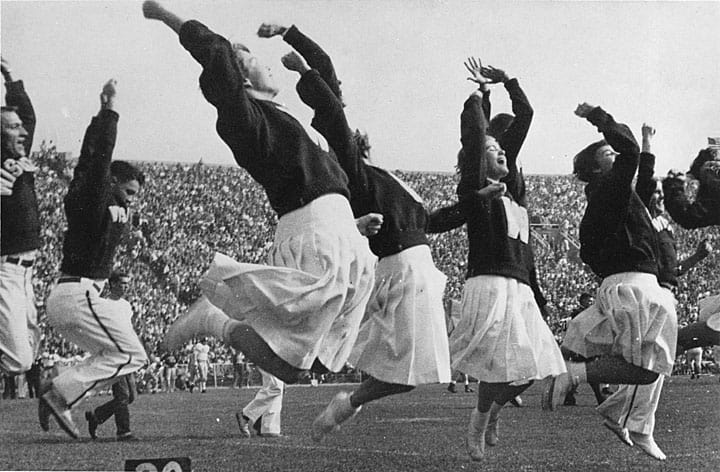
Many believe that with its outsized influence, Varsity could have taken a leading role in preventing the kind of systemic abuse now being exposed by survivors. Instead, the company has consistently deflected responsibility, claiming that athlete safety falls under the jurisdiction of USA Cheer and USASF. But critics argue that this separation is more technical than real. In reality, it’s Varsity that sets policy and funds the two governing bodies.
Since the passage of the SafeSport Act in 2018, most major youth and Olympic sports organizations have adopted stricter safety protocols. But cheerleading’s response has lagged. Although Varsity and its affiliates implemented some policies, enforcement remains weak. Experts and survivor advocates suggest this is not accidental, but tied to Varsity’s broader strategy: maximizing profits, maintaining brand dominance, and controlling every link in the cheerleading supply chain. In that system, critics argue, athlete safety often takes a back seat to corporate interests.
The result is a structure disturbingly similar to what allowed abuse to fester for years in USA Gymnastics: a tightly controlled, for-profit ecosystem that lacked transparency, discouraged external oversight, and allowed powerful insiders to shield one another. As Varsity Spirit sexual abuse claims continue to mount, questions persist not only about what Varsity knew, but whether its business model was built to look the other way.
The problem isn’t just with how abuse allegations are handled. It’s how difficult it is to report them in the first place. Parents aren’t adequately informed on how to file sexual misconduct reports. Furthermore, there’s no consistent educational effort to address this gap.
Under USA Cheer’s own SafeSport policy, registered members such as gym owners, coaches, and event organizers are required to report suspected abuse to law enforcement within 24 hours. But this mandate applies only to individual members. It does not apply to the governing organizations themselves. If a coach fails to report abuse, USA Cheer is tasked with investigating that failure. However, no such obligation exists for USA Cheer or USASF as entities to act first or take internal responsibility for institutional lapses.
Jurisdictional ambiguity adds another layer of risk. While USA Cheer may open a preliminary inquiry into an allegation, its policy states that it cannot supersede local, state, or federal jurisdiction. This often results in delays, confusion, and a lack of enforcement.
Even when individuals are suspended or banned, the tracking system remains flawed. Both USASF and USA Cheer maintain public lists of individuals found to have violated SafeSport guidelines, including those accused of sexual misconduct. These lists have expanded under public pressure in recent years. But advocates say they remain incomplete. Individuals banned in one gym or region sometimes reappear in another, as witnessed in the previously mentioned case in Ohio.
In August 2022, the suicide of 49-year-old Scott Foster marked the beginning of a far-reaching scandal in the competitive cheer world. Foster, founder of Rockstar Cheer and Dance in Greenville, South Carolina, died of a self-inflicted gunshot wound shortly after learning he was under federal investigation for the alleged sexual abuse of minors. According to lawsuits and attorney statements, Foster had been abusing underage athletes for years, often during travel to competitions, at his home, and even at his gym.
Civil and federal lawsuits soon followed, naming not only Foster’s estate and Rockstar Cheer, but also USASF, Varsity Spirit, and Bain Capital. Plaintiffs allege that these organizations failed to supervise, investigate, or take meaningful action to prevent Foster’s misconduct, despite signs that abuse was occurring. One complaint detailed how Foster groomed a minor athlete through Snapchat, exchanged nude photos, and engaged in multiple sexual encounters with her across several states. He also allegedly supplied alcohol to athletes and encouraged drug use.
In addition to Foster, his wife and six coaches—described as his protégés—were later added to a federal lawsuit. Five of the coaches had previously worked at Rockstar.
Following the scandal, Rockstar Cheer in South Carolina shut down indefinitely, and at least 10 gyms across the country severed ties with the Rockstar name. In public statements, both USASF and Varsity condemned the allegations but offered limited comment.
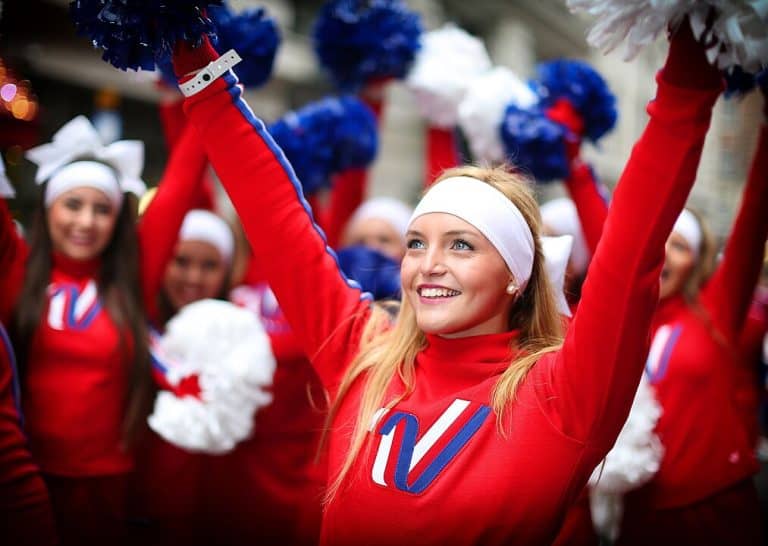
In the wake of the Scott Foster scandal, survivors began filing civil lawsuits against not only Foster’s estate and gym, but also against the corporate structure many argue enabled the abuse. In 2023, a federal judge allowed several of those claims to move forward.
Specifically, U.S. District Court Judge Henry M. Herlong, Jr. ruled that twelve former youth cheerleaders could pursue negligence and unjust enrichment claims against Varsity Brands. Attorneys for the plaintiffs viewed the ruling as a meaningful step forward. It meant that the judge allowed the central arguments of corporate negligence and unjust financial gain to be heard in court.
The judge also allowed certain claims against USASF to move forward, including breach of contract and negligence tied to its responsibility for certifying coaches and enforcing safety standards. The lawsuits argue that Varsity’s control over USASF allowed the company to shape safety enforcement practices while avoiding direct liability for how those rules were applied—or ignored. Varsity had argued it did not owe plaintiffs a legal duty of care, but the judge ruled otherwise, citing Varsity’s structural role in shaping the environment in which the alleged abuse occurred.
To date, no public settlements have been announced in these abuse-related cases. However, a preliminary settlement was reported in a Florida federal case in early 2024, though the terms remain sealed. Attorneys that partner with Survivors Rights continue to accept new Varsity Spirit-related sexual abuse, assault and harassment claims.
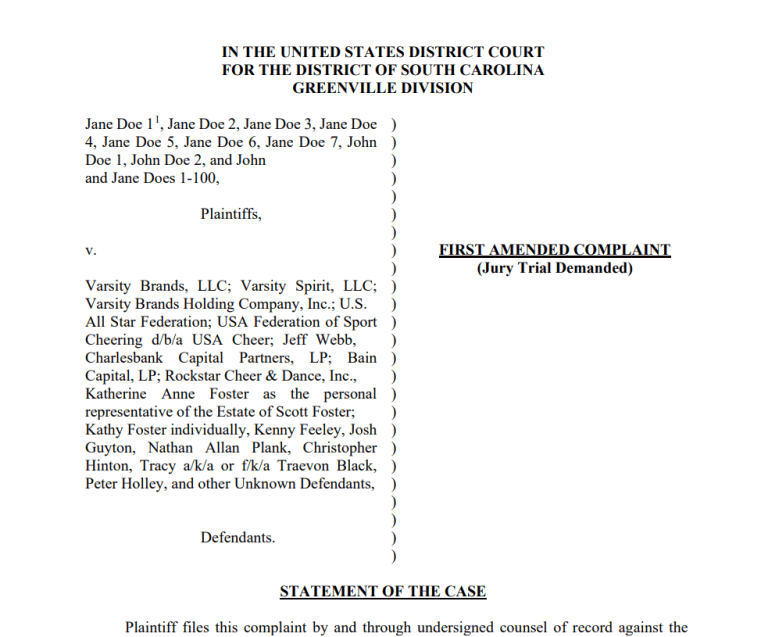
Despite the growing number of lawsuits filed by survivors of abuse in the competitive cheerleading world, there is currently no class action and no federal multidistrict litigation (MDL) for these cases.
In early 2023, the U.S. Judicial Panel on Multidistrict Litigation (JPML) considered consolidating several of the Varsity-related sex abuse lawsuits into a single MDL.
Centralizing cases in an MDL can streamline the pretrial proceedings. Rather than having the same evidence presented multiple times in different U.S. federal district courts, a single MDL reduces duplicate discovery.
At the time of the MDL consideration, nine lawsuits had been filed in six federal courts, naming common defendants including Varsity Spirit, Bain Capital, USASF, and USA Cheer. Plaintiffs asked that the cases be transferred to a single federal court for efficiency and consistency. However, the JPML denied the request.
The panel ruled that, while the cases shared some overlapping facts and parties, too many of the allegations were specific to individual coaches, gyms, and incidents of abuse. With more than 30 separate coaches and gyms named—most appearing in only one lawsuit—the court determined that consolidating the cases would not significantly reduce complexity.
Because of this decision, each lawsuit is proceeding independently in the district where it was filed. However, if more cases are filed or coordination among courts becomes impractical, the JPML has the authority to reconsider and create an MDL at a later date.
Update: In October 2025, a new lawsuit filed in Georgia added to the growing wave of litigation against Varsity Spirit, USA Cheer, and other major cheer organizations. The complaint, brought by a former metro Atlanta cheerleader, alleges that a coach named in multiple criminal investigations groomed and sexually assaulted underage athletes over several years while working at various gyms and schools. The lawsuit accuses Varsity Brands, the Walton County School District, and others of negligence and of fostering a culture that prioritized the competitive cheer industry’s image over athlete safety. Attorneys representing the plaintiff say the case aims not only to seek justice for survivors but also to expose systemic failures that allowed abuse to persist unchecked.
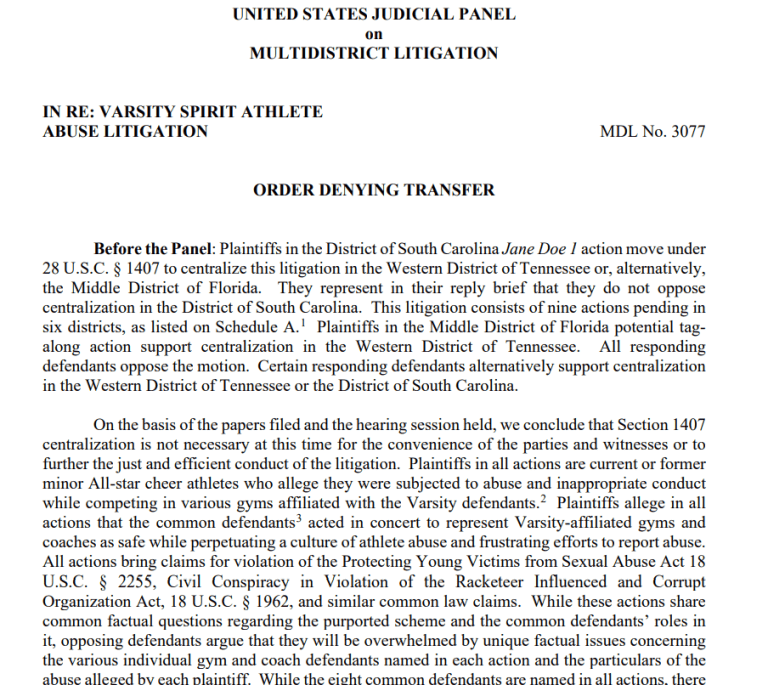
Title IX is a federal civil rights law passed in 1972 that prohibits sex-based discrimination in any education program or activity receiving federal funding. While Title IX has reshaped college athletics and expanded protections against gender discrimination in education, it has not fully extended those protections to athletes in competitive cheerleading. As ESPN reported in 2012, a federal court decision ruled that competitive cheer did not qualify as a sport under Title IX. As a result, many cheerleaders are excluded from the same structural safeguards afforded to other varsity athletes.
Cheerleaders often train year-round, perform at multiple events, and contribute to their schools’ financial and social ecosystem. Yet under current Title IX standards, they remain in a gray area—treated more as entertainers than athletes. This lack of formal recognition has left many cheerleaders more vulnerable to sexual harassment, gender-based discrimination, and harmful stereotypes.
Varsity has historically opposed efforts to classify cheerleading as a sanctioned sport. Critics argue this stance preserves its commercial dominance by avoiding the stricter safety regulations and oversight that typically accompany formal athletic recognition.
The Legal Grey Area Leaves Cheer Athletes Vulnerable
A 2021 case illustrates the limits of Title IX in addressing these issues. In Richardson v. Northwestern University, former cheerleader and Truman Scholar Hayden Richardson sued the university, alleging that she and her teammates were subjected to widespread sexual and racial harassment. Her lawsuit claimed that the university’s athletic department failed to take her Title IX complaint seriously, viewing cheerleaders as fundraising tools rather than protected participants in school-sponsored athletics.
Although Varsity’s new Pro Cheer League markets cheerleading as a legitimate, professional sport, survivors and advocates say little has changed when it comes to addressing systemic harassment. Without Title IX recognition or equivalent protections, competitive cheerleaders continue to operate in a space with fewer legal and institutional safeguards.
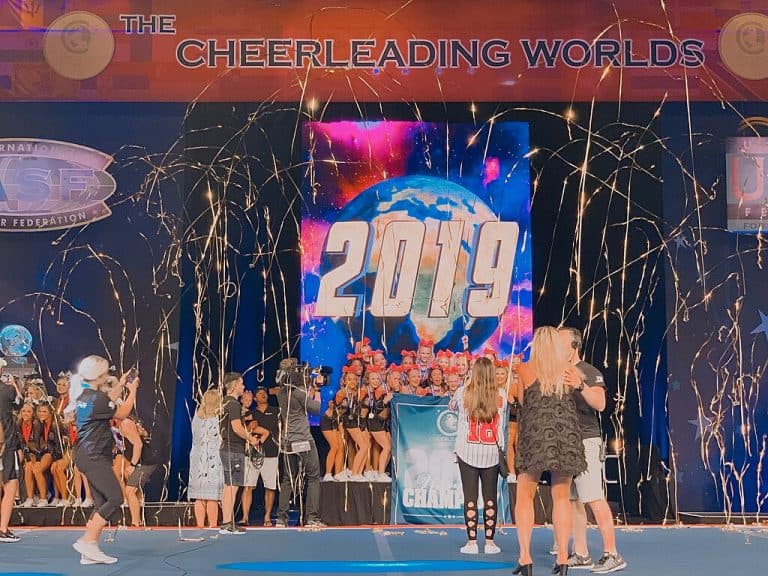
As lawsuits against Varsity Spirit and its affiliates mounted, the company has consistently denied liability and has not issued a formal apology. As previously noted, Varsity’s response came in the form of a 2022 letter from then-President Bill Seely, which suggested that the company would vigorously defend itself against frivolous claims.
Rather than publicly accepting responsibility, Varsity has focused much of its legal strategy on shifting liability to its insurance providers. In October 2023, Varsity Brands Holding Co., LLC, along with its subsidiaries Varsity Brands, LLC and Varsity Spirit, LLC, filed suit in Delaware against several insurance carriers, including Arch Insurance Company and United States Fidelity and Guaranty Company. The company alleged that its insurers wrongfully denied coverage for sexual abuse claims brought by former cheer athletes, despite policy terms that Varsity contends required defense and indemnification.
By late 2023, all but two of the more than 30 lawsuits filed by survivors had proceeded to mediation. In early 2024, a Delaware court allowed Varsity’s breach-of-contract and bad-faith claims against several insurers to move forward. Still, there have been no public settlements disclosed in the abuse-related litigation.
The claims filed against Varsity include alleged violations of the Protecting Young Victims from Sexual Abuse Act, as well as state-level charges involving negligence, fraud, and racketeering. While the legal proceedings continue, the company maintains its denial of wrongdoing and has not issued a direct apology to the individuals who say they were harmed under its watch.
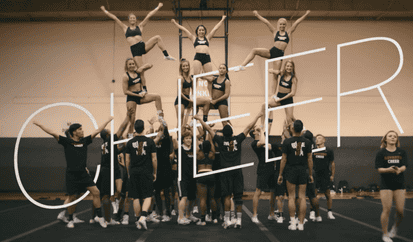
Varsity Spirit’s recent announcement of its new professional cheerleading league, Pro Cheer, is a paradox. On one hand, it presents an opportunity for a post-collegiate athletic career path.
But while the company looks ahead, unresolved harm continues to surface. The lawsuits aren’t just about sexual abuse or insurance disputes anymore. They now extend to Varsity’s failure to protect attendees at its own events.
In March 2025, a chaotic stampede during a national cheer competition in Dallas left dozens injured. The resulting lawsuit accuses Varsity of failing to implement even basic crowd safety measures. That moment of panic and injury is emblematic of a deeper pattern, one in which Varsity failed to protect young athletes from known risks, whether on the mat or off.
The lawsuits, press conferences, and sworn testimonies filed over the past several years paint a stark contrast to the polished image projected by televised competitions and brand partnerships. They tell a story of preventable harm and of warning signs that were ignored.
Survivors have not been forgotten. And they are no longer staying silent.
If you or a loved one experienced sexual abuse by a coach, choreographer, or other adult affiliated with Varsity Spirit, USASF, or a Varsity-sponsored gym, legal options may still be available.
Please fill out the brief, confidential contact form below. Your information will be shared only with attorneys currently reviewing Varsity Spirit-related sexual abuse claims. There are no upfront costs, and consultations are completely free.
You are not alone. Your voice matters.
Multiple lawsuits filed across the U.S. allege that Varsity Spirit, along with affiliated organizations like USASF and USA Cheer, failed to prevent or respond to reports of sexual abuse by coaches, choreographers, and other adults involved in competitive cheerleading. Plaintiffs claim the organizations ignored red flags and allowed known abusers continued access to children.
Possibly. Many states have extended or temporarily lifted the statute of limitations for child sexual abuse survivors. Depending on where and when the abuse occurred, you may still have legal options. A qualified attorney can evaluate your case confidentially and explain your rights.
Not at this time. In 2023, the Judicial Panel on Multidistrict Litigation (JPML) declined to consolidate the cases into a single MDL (multidistrict litigation), citing differences in individual facts and defendants. However, individual lawsuits are ongoing across multiple states, and new cases are still being filed.
Defendants vary by case but may include Varsity Spirit, USASF, USA Cheer, specific gyms, coaches, choreographers, and other affiliated individuals or organizations. Lawsuits may allege negligence, fraud, civil conspiracy under RICO, and violations of federal child protection laws.
You can start by filling out the confidential contact form on this page.